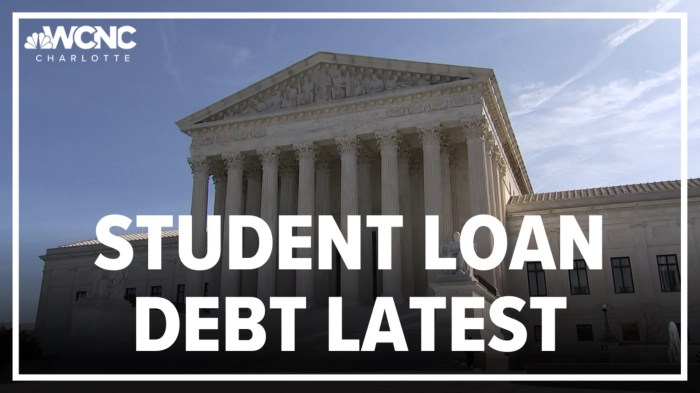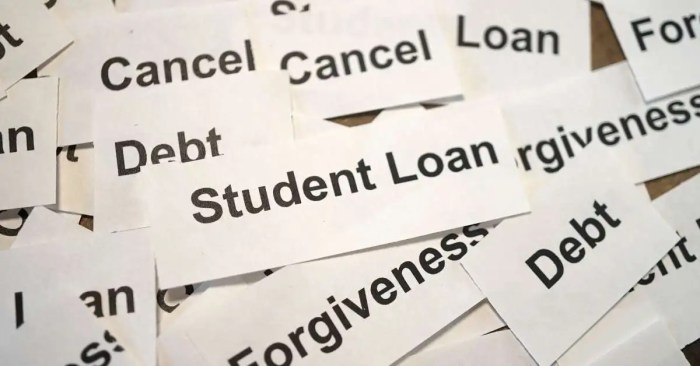
The weight of student loan debt is a significant concern for many, and the question of what happens if you never pay looms large. This exploration delves into the immediate and long-term consequences of student loan default, covering the impact on your credit score, employment prospects, and even your legal standing. We’ll examine the various legal ramifications, including wage garnishment and tax refund offsets, as well as explore available government programs and repayment options designed to help you navigate this challenging situation. Finally, we’ll address the often-overlooked impact on your mental and emotional well-being.
Understanding the potential repercussions of student loan default is crucial for making informed financial decisions. This guide aims to provide a comprehensive overview, empowering you with the knowledge needed to manage your debt effectively or to understand the implications if you find yourself unable to repay.
Immediate Consequences of Non-Payment

Failing to make your student loan payments will trigger a chain reaction with significant and lasting consequences. Understanding these repercussions is crucial for responsible financial management. The severity of the consequences will depend on the number of missed payments and the type of loan.
Initial Lender Actions
Following a missed payment, your lender will typically initiate a series of actions. First, you’ll receive a late payment notice, often accompanied by a late fee. This notice serves as a formal reminder and an opportunity to rectify the situation. If the payment remains outstanding, the lender will likely continue to contact you via phone, email, and mail, escalating the urgency of the situation. They may also offer options such as forbearance or deferment, temporarily suspending or reducing payments. However, these options often come with their own set of conditions and potential long-term financial implications.
Impact on Credit Scores
Missing student loan payments severely damages your credit score. The impact is not immediate but builds with each missed payment. A single missed payment can result in a credit score drop ranging from 50 to 100 points, depending on your existing credit history and overall credit profile. Multiple missed payments can lead to a much more significant drop, potentially impacting your ability to secure loans, rent an apartment, or even obtain certain jobs. A consistently poor payment history can significantly lower your credit score for years, making it difficult to rebuild financial stability. For example, someone with a good credit score of 750 could see it plummet to 650 or lower after several missed payments.
Communication from Lenders and Collection Agencies
Expect frequent and persistent communication from your lender and, eventually, collection agencies. Lenders will initially attempt to contact you directly to arrange payment. If these attempts are unsuccessful, they may sell your debt to a collection agency. Collection agencies are more aggressive in their pursuit of payment and may employ various tactics, including repeated phone calls, letters, and even legal action. These communications can be stressful and disruptive, and it’s important to understand your rights as a borrower while engaging with these agencies. Remember, you are legally obligated to respond to their communications, even if you cannot make a payment. Ignoring them will only worsen the situation.
Consequences of Missed Payments: A Comparison
| Number of Missed Payments | Credit Score Impact | Collection Agency Involvement | Legal Action Likelihood |
|---|---|---|---|
| One | 50-100 point drop; potential for negative mark on credit report | Unlikely | Low |
| Multiple (3-6) | 100+ point drop; significant negative impact on credit report | Likely | Moderate |
| Multiple (6+) | Severe credit score damage; difficulty obtaining credit in the future | Highly likely; potential for wage garnishment | High; potential for lawsuit and judgment |
Long-Term Financial Implications
Defaulting on student loans casts a long shadow, extending far beyond the immediate consequences. The ramifications significantly impact your financial future, hindering your ability to achieve long-term financial goals and creating lasting hardship. The damage to your credit score and overall financial health can be profound and difficult to overcome.
The impact on your ability to secure future loans is substantial. A poor credit history, heavily influenced by delinquent student loan debt, makes it incredibly difficult to obtain mortgages, auto loans, and even personal loans. Lenders view borrowers with a history of default as high-risk, resulting in significantly higher interest rates or outright loan denials. This can severely limit your opportunities for homeownership, vehicle purchases, and other significant financial investments.
Difficulty Securing Employment Due to Poor Credit
Many employers conduct credit checks as part of the hiring process, particularly for positions involving financial responsibility or access to sensitive information. A poor credit score, a direct consequence of student loan default, can significantly reduce your employment prospects. Employers may perceive individuals with damaged credit as unreliable or irresponsible, leading to rejection during the application process. This can trap individuals in a cycle of financial hardship, limiting their ability to secure higher-paying jobs that could help them overcome their debt.
Financial Burdens Faced by Individuals with Severely Damaged Credit
The financial burdens faced by individuals with severely damaged credit due to student loan default are multifaceted. They may be forced to rent instead of buying a home, limiting their ability to build equity and wealth. They may have to rely on high-interest loans for essential purchases, further increasing their debt burden. Furthermore, they may face difficulties securing insurance at affordable rates, adding to their financial strain. In essence, a damaged credit score significantly limits financial opportunities and creates a cycle of hardship that is difficult to break.
Hypothetical Scenario: The Long Road to Recovery
Consider Sarah, a recent college graduate who defaulted on her $40,000 student loan. Initially, the immediate consequences included wage garnishment and damage to her credit score. Over the next five years, her credit score remains severely damaged, preventing her from obtaining a mortgage or an auto loan. She is forced to rent an expensive apartment, limiting her ability to save. Without a car, she struggles to find a job that pays enough to keep up with her living expenses and the accruing interest on her defaulted loan. The interest on her defaulted loan accumulates, increasing her debt to $60,000 within five years. Without access to credit, she faces limited options to consolidate her debt or secure better financial terms. This scenario illustrates the snowball effect of student loan default, where initial hardship quickly escalates into a long-term financial crisis.
Legal Ramifications of Default
Defaulting on your student loans carries significant legal consequences that can profoundly impact your financial well-being and even your daily life. These repercussions extend beyond simple late payment fees and can lead to serious legal actions with long-lasting effects. Understanding these ramifications is crucial for responsible financial planning.
Wage Garnishment
Wage garnishment is a legal process where a portion of your earnings is automatically deducted by your employer and sent directly to your loan servicer to satisfy your outstanding debt. The amount garnished is typically capped by federal law, but it can still significantly reduce your take-home pay, making it difficult to meet your living expenses. For example, the Consumer Financial Protection Bureau (CFPB) notes that the maximum amount that can be garnished is typically 15% of disposable earnings (income after taxes and certain other deductions), though it can be higher in some cases if child support or other legal obligations are involved. This can create considerable financial hardship, especially for those with already tight budgets. The garnishment process begins with a court order, often obtained by the lender after repeated attempts to collect the debt have failed.
Tax Refund Offset
The federal government allows student loan servicers to intercept and seize a portion or all of your tax refund to apply towards your outstanding student loan debt. This process, known as tax refund offset, happens automatically if you owe a significant amount on your federal student loans and have filed your taxes. The IRS will directly transfer the funds to your loan servicer. The entire refund can be seized to offset the debt. For instance, if you are owed a $3,000 refund and owe $5,000 on your student loans, the entire $3,000 refund may be applied to your debt. This can leave you without a crucial financial resource that many rely on for annual expenses or debt repayment.
Legal Actions by Lenders
Lenders can take several legal actions against borrowers who default on their student loans. These actions can include lawsuits, resulting in court judgments against the borrower. A court judgment can lead to further collection actions, such as wage garnishment, bank levy (seizing funds from bank accounts), and property liens (placing a claim on your assets). These legal actions can significantly damage your credit score, making it difficult to obtain loans, credit cards, or even rent an apartment in the future. The legal fees associated with defending against these lawsuits can further exacerbate the financial burden.
Passport Restrictions
In certain circumstances, defaulting on federal student loans can lead to restrictions on your ability to obtain or renew a passport. The U.S. Department of State can revoke or deny passport applications if a significant amount of debt is owed to the federal government, including student loans. This can severely limit your ability to travel internationally, impacting personal and professional opportunities. This restriction is generally lifted once the debt is resolved.
Government Programs and Options for Repayment

Navigating the complexities of student loan repayment can be daunting, but several government programs are designed to make the process more manageable. Understanding these options and how to access them is crucial for borrowers facing financial hardship or seeking long-term relief. This section will Artikel key programs and the steps involved in applying for assistance.
Available Government Student Loan Repayment Programs
The federal government offers a range of programs to help borrowers manage their student loan debt. These programs provide different approaches to repayment, considering individual financial circumstances. Understanding the nuances of each program is essential for selecting the most suitable option.
- Income-Driven Repayment (IDR) Plans: These plans adjust your monthly payment based on your income and family size. Several IDR plans exist, each with its own eligibility criteria and payment calculation method.
- Public Service Loan Forgiveness (PSLF): This program offers forgiveness of remaining federal student loan debt after 120 qualifying monthly payments while working full-time for a qualifying government or non-profit organization.
- Teacher Loan Forgiveness Program: This program forgives a portion of your federal student loans if you teach full-time for five consecutive academic years in a low-income school or educational service agency.
- Federal Loan Consolidation: Combining multiple federal student loans into a single loan can simplify repayment, potentially lowering your monthly payment or extending the repayment period.
Comparison of Income-Driven Repayment Plans
Eligibility for income-driven repayment plans generally requires having federal student loans and providing documentation of your income and family size. Specific requirements vary slightly depending on the plan chosen. For example, some plans may require a minimum loan balance, while others might have income thresholds. The key difference between plans lies in the formula used to calculate your monthly payment and the length of the repayment period. Some plans may offer loan forgiveness after a certain number of years, while others may not. It’s important to compare the features of each plan to determine which best suits your individual circumstances.
Applying for Student Loan Forgiveness or Deferment Programs
The application process for student loan forgiveness or deferment programs varies depending on the specific program. Generally, it involves completing an application form, providing documentation to support your eligibility (such as tax returns or employment verification), and submitting the completed application to the relevant agency. Forgiveness programs often require consistent payments for a specified period, meeting specific employment requirements, or demonstrating financial hardship. Deferment, on the other hand, temporarily postpones payments but typically doesn’t reduce the overall loan amount. Thorough review of program guidelines is crucial before applying.
Contacting Government Agencies for Assistance
Effectively navigating the student loan repayment system often requires contacting the relevant government agencies. Taking proactive steps to seek assistance ensures a smoother process and reduces the risk of default.
- Identify your loan servicer: Locate the contact information for your student loan servicer, the company responsible for managing your loans. This information is usually available on the National Student Loan Data System (NSLDS) website.
- Gather necessary documents: Before contacting any agency, gather all relevant documents, such as tax returns, pay stubs, and employment verification.
- Contact your loan servicer: Begin by contacting your loan servicer to discuss your repayment options and explore available programs.
- Contact the Federal Student Aid (FSA) website: The FSA website provides comprehensive information on federal student aid programs and contact information for relevant agencies.
- Seek professional guidance: If needed, consult with a financial advisor or student loan counselor for personalized guidance and assistance.
Impact on Mental and Emotional Wellbeing
The overwhelming burden of significant student loan debt, particularly when default occurs, can have a profound and lasting impact on an individual’s mental and emotional wellbeing. The constant worry and stress associated with financial instability significantly affect overall psychological health, leading to a range of negative consequences. This section will explore the various ways in which student loan debt and default can negatively affect mental health, relationships, and overall quality of life.
The stress and anxiety stemming from financial hardship caused by loan default are substantial. Individuals may experience sleep disturbances, difficulty concentrating, and increased irritability. The constant pressure to find solutions, coupled with the fear of legal repercussions, can lead to feelings of hopelessness and overwhelm. This chronic stress can manifest physically as well, contributing to problems like headaches, digestive issues, and weakened immunity. The uncertainty about the future and the inability to plan for long-term goals, such as homeownership or starting a family, further exacerbates these feelings.
Stress and Anxiety Related to Financial Hardship
The financial instability resulting from student loan default can create a pervasive sense of anxiety. Individuals may struggle to meet basic needs, such as housing, food, and healthcare, leading to increased stress levels. The constant fear of wage garnishment, debt collection calls, and legal action creates a climate of fear and uncertainty, impacting mental clarity and decision-making abilities. For example, a person facing default might constantly worry about their bank account balance, leading to avoidance of checking their finances, which in turn only increases their anxiety. This cycle of avoidance and anxiety can become debilitating.
Impact of Debt on Relationships and Overall Quality of Life
Student loan debt and its associated stress can significantly strain personal relationships. Arguments about finances are common, and the constant worry about money can lead to increased tension and resentment within families and romantic partnerships. The inability to pursue personal goals, such as travel or further education, due to financial constraints can also negatively impact relationships and overall life satisfaction. For instance, a couple might postpone having children or buying a home due to the weight of defaulted loans, leading to frustration and conflict. This financial burden can also isolate individuals from social activities and opportunities, leading to feelings of loneliness and isolation.
Emotional Toll of Facing Legal Repercussions
The legal repercussions of student loan default can be emotionally devastating. The process of facing lawsuits, wage garnishments, and potential legal action can be incredibly stressful and demoralizing. The fear of losing assets, impacting credit score, and facing potential imprisonment (in extreme cases) contributes significantly to feelings of anxiety, depression, and shame. Many individuals experience a profound sense of failure and self-blame, leading to decreased self-esteem and confidence. The legal process itself is often confusing and overwhelming, adding to the emotional burden. The constant communication with debt collectors and legal professionals can further amplify stress levels and create feelings of helplessness.
Conclusive Thoughts

Defaulting on student loans can have severe and far-reaching consequences, impacting your credit, finances, and even your mental health. While the path to default is fraught with challenges, understanding the potential outcomes – from immediate credit score drops to long-term legal battles – is the first step towards responsible debt management. Exploring available government programs and repayment options can significantly mitigate the risks associated with non-payment. Proactive planning and informed decision-making are key to avoiding the pitfalls of student loan default and securing a financially stable future.
Answers to Common Questions
Can I negotiate a lower payment amount with my lender?
Yes, many lenders are willing to work with borrowers facing financial difficulties. Contact your lender directly to discuss potential options like forbearance or income-driven repayment plans.
What happens if I declare bankruptcy?
While some debts can be discharged through bankruptcy, federal student loans are notoriously difficult to discharge. Consult with a bankruptcy attorney to assess your specific circumstances.
Will defaulting on my student loans affect my ability to rent an apartment?
Yes, landlords often check credit reports as part of the application process. A poor credit score due to loan default can significantly hinder your ability to secure housing.
How long does a student loan default stay on my credit report?
Negative information, such as a student loan default, typically remains on your credit report for seven years from the date of the default.
